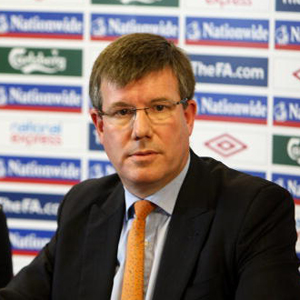By David Owen
Oh dear, oh dear, oh dear.
No sooner does England’s accident-prone World Cup bid appear to be getting its act together and heading for calmer seas then the water turns choppy again.
Ian Watmore’s shock resignation as Football Association Chief Executive after what, even by recent standards, is a remarkably short stint in the post is a blow to England’s hopes of winning the 2018 World Cup and no mistake.
The problem is not that a key individual has left; as far as I am aware, Watmore had little if any direct input into big bid-related decisions.
It is that his abrupt and so far incompletely explained departure threatens to bring all the old questions about English football’s dysfunctional governance flooding back to the surface again.
From Hackney Marshes to FIFA House.
When five years ago Lord Burns, one of the UK’s pre-eminent organisational thinkers, was brought in to carry out a structural review of the FA, he recommended restructuring the board.
At the time, this was divided equally between representatives of the professional and grass-roots games, with the chair of the FA Council and the FA Chief Executive included as non-voting members.
This model might almost have been designed to create deadlock.
As a senior former FA insider once told me: “Nine times out of ten, any critical vote will go six-six.
“You have got a board that is set up to fail.”
Instead, Lord Burns proposed a board comprising two executive directors, two or three independent non-executives and three directors each appointed by the professional and grass-roots games.
His recommendations have not been fully implemented.
The board today consists of an independent chairman (Lord Triesman), the chief executive (position vacant) and five representatives each from the professional and national, or grass-roots, games.
 Was frustration with the decision-making structure the reason Watmore (pictured) opted for such an inordinately early bath?
Was frustration with the decision-making structure the reason Watmore (pictured) opted for such an inordinately early bath?
I don’t know – but pending a better explanation it seems a reasonable working hypothesis.
The terse FA statement offered no clues, while leaving open the possibility that more might be said today.
“Ian Watmore tendered his resignation to me on Friday,” the statement, attributed to Lord Triesman, said.
“I asked him to re-consider over the weekend.
“However, he has confirmed today that his position remains unchanged and I have accepted it with great regret.
“There will be a Board meeting tomorrow at noon.
“I am unable to make any further comment until after that meeting.”
I wonder whether the minutes of an earlier board meeting, held on November 19 last year, don’t offer more of a clue as to the source of Watmore’s frustration.
The minutes set out in measured tones the board’s response to a detailed review, presented by “the CEO” from his first 100 days in office.
“The Board were appreciative of the review and generally supportive, but wanted time to fully digest it,” the minutes state.
“The Board expressed a few concerns about the cost of implementing the CEO’s proposals although he pointed out that there would be no overall increase in costs.
“The CEO also pointed out that there was no change in the FA Vision and his proposals merely involved a plan to implement the Vision and to sharpen the structure.
“The CEO agreed to turn his presentation into a paper for further consultation with members of the Board and to make presentation to the Premier League’s Management Team.
“The Board agreed to discuss the proposals again at the December Board Meeting once they had had the opportunity to discuss them further with the CEO.”
Make of that what you will. It hardly sounds like an unequivocal endorsement though, does it?
The point is, if world football’s bosses harbour doubts about the effectiveness of the FA’s decision-making mechanisms, you would think they would be unlikely to entrust it with their flagship quadrennial tournament.
Let’s not overplay this: Watmore’s departure does not put victory for England out of reach any more than an injury to, say, Emile Heskey would dispel all thoughts of winning the 2010 World Cup in South Africa in July.
Other things have been working in the English bid’s favour in recent weeks, not least the financial challenges presented to FIFA by staging this year’s tournament in uncharted African territory.
The sporting hierarchy in one of England’s main rivals, Russia, is moreover in a state of turmoil after the country’s disappointing performance at the recent Winter Olympics.
But bid chief executive Andy Anson and his colleagues will have questions to answer as a result of this.
Supporters of England’s bid must hope that their answers are convincing.
David Owen is a specialist sports journalist who worked for 20 years for the Financial Times in the United States, Canada, France and the UK. He ended his FT career as sports editor after the 2006 World Cup and is now freelancing, including covering last year’s Beijing Olympics. An archive of Owen’s material may be found by Twitter users at www.twitter.com/dodo938.
.jpg)